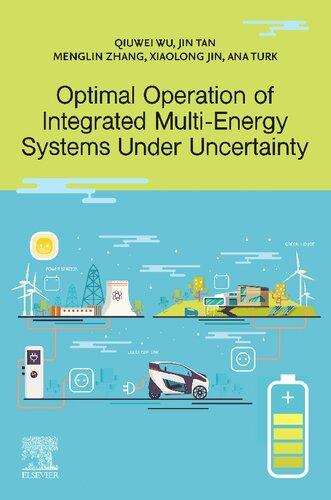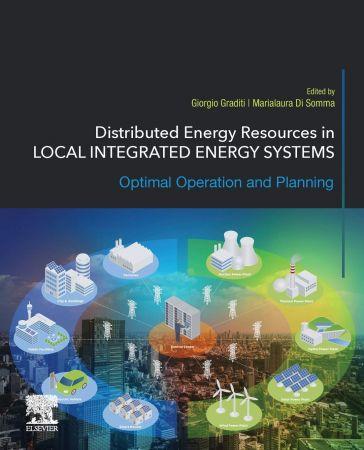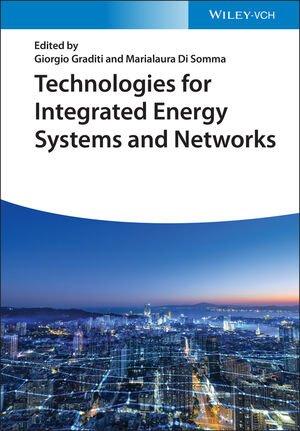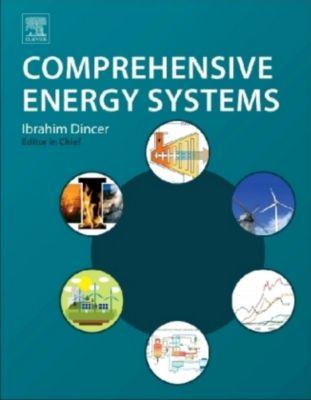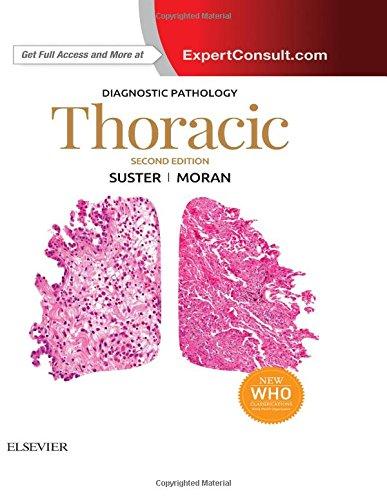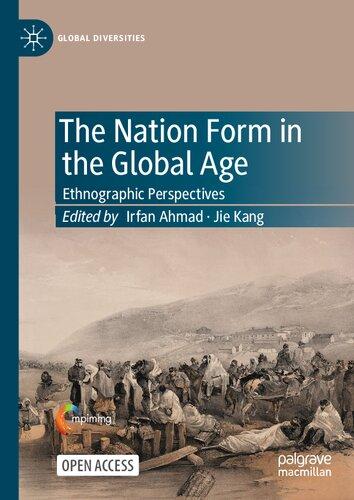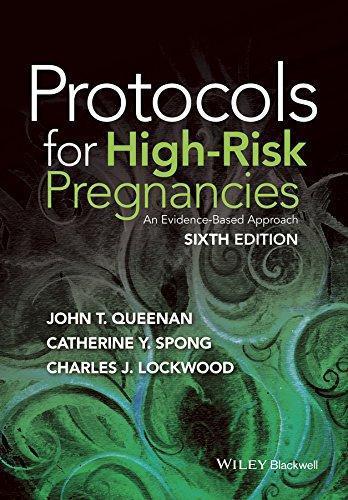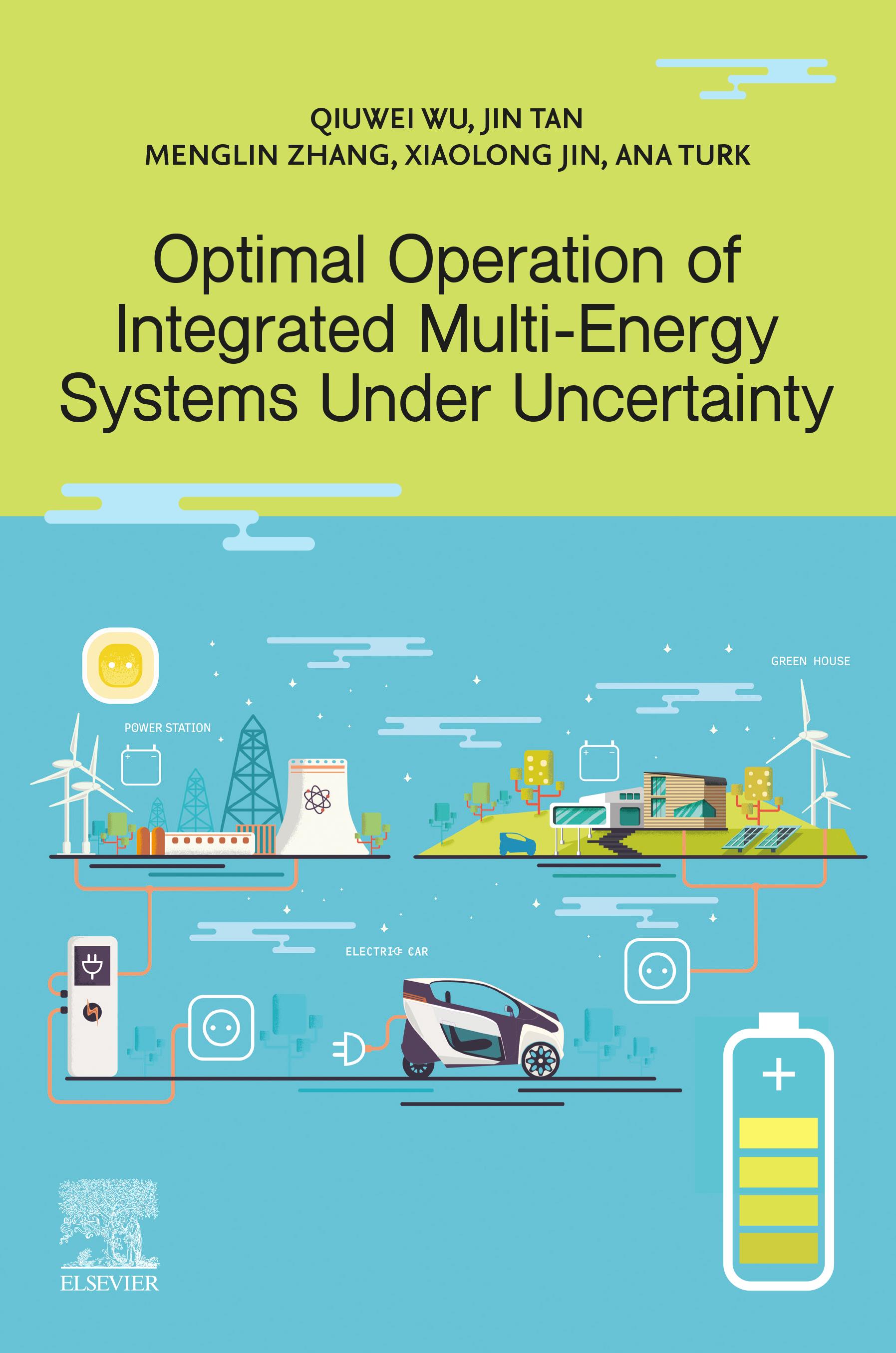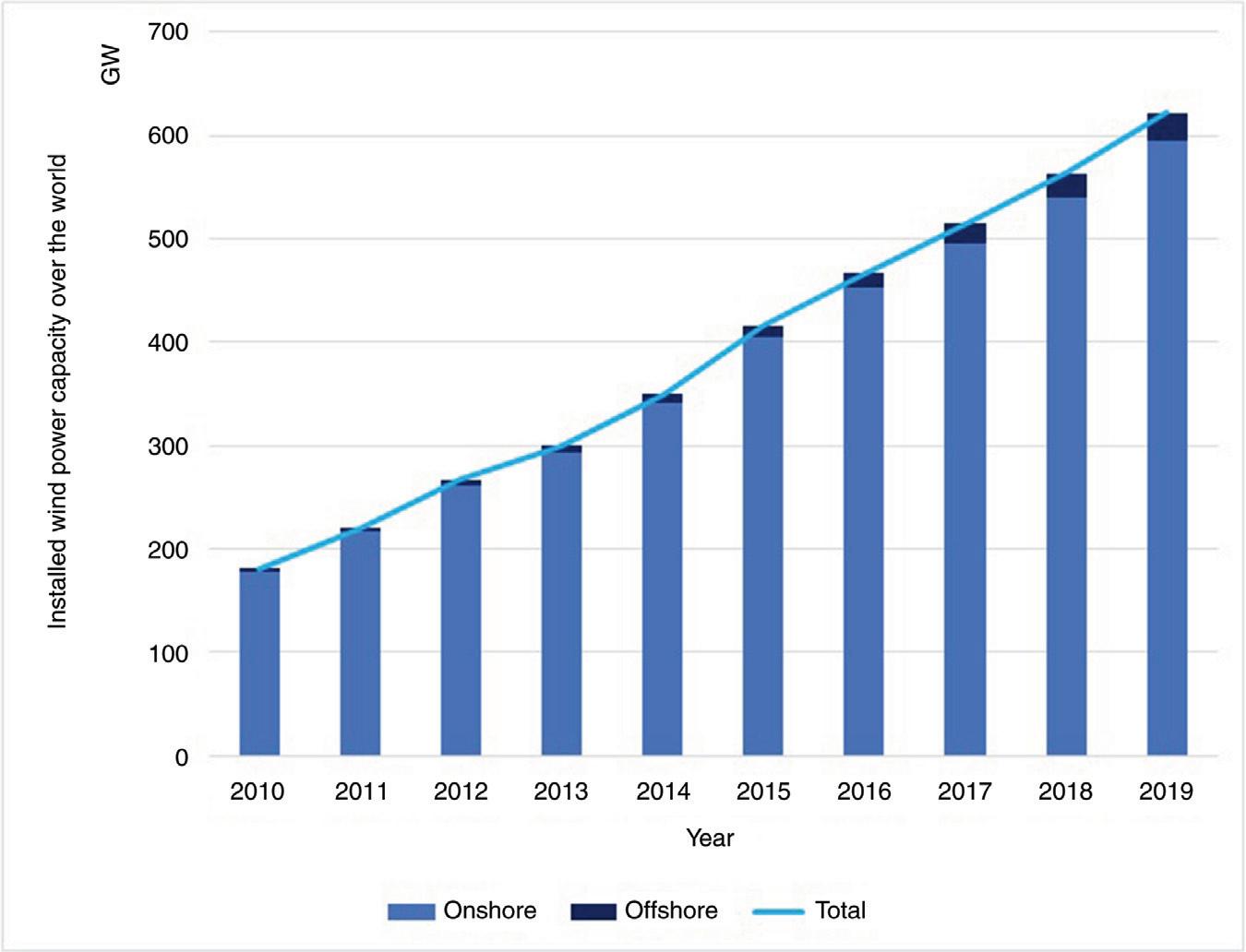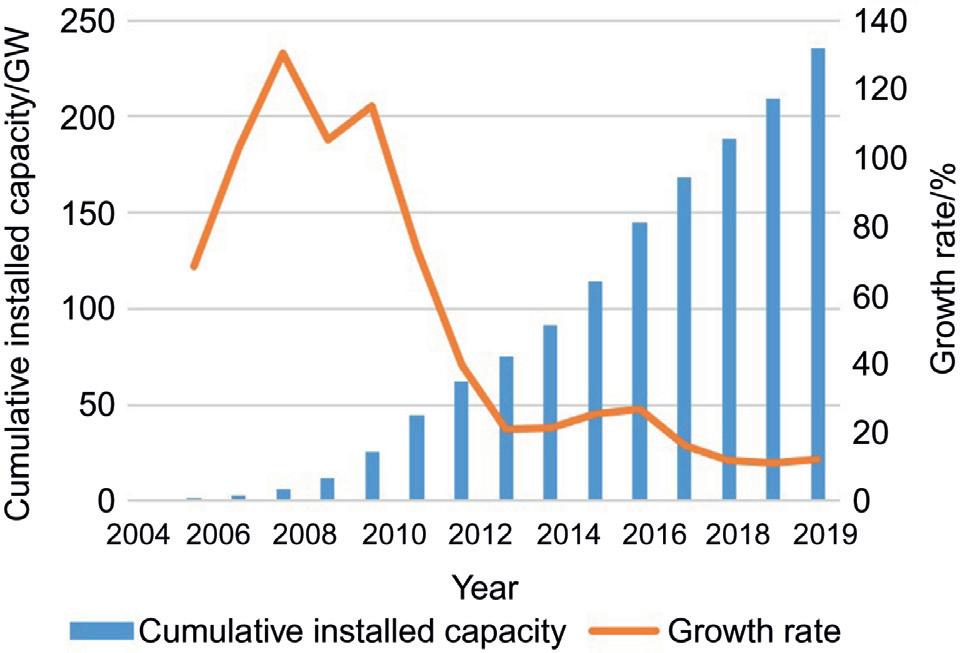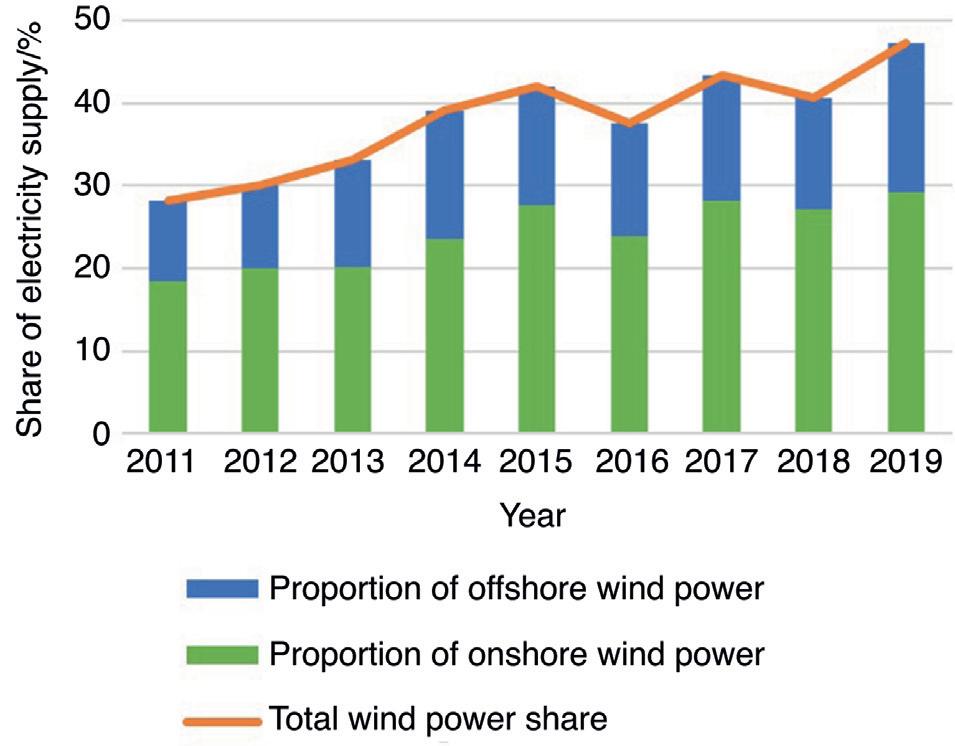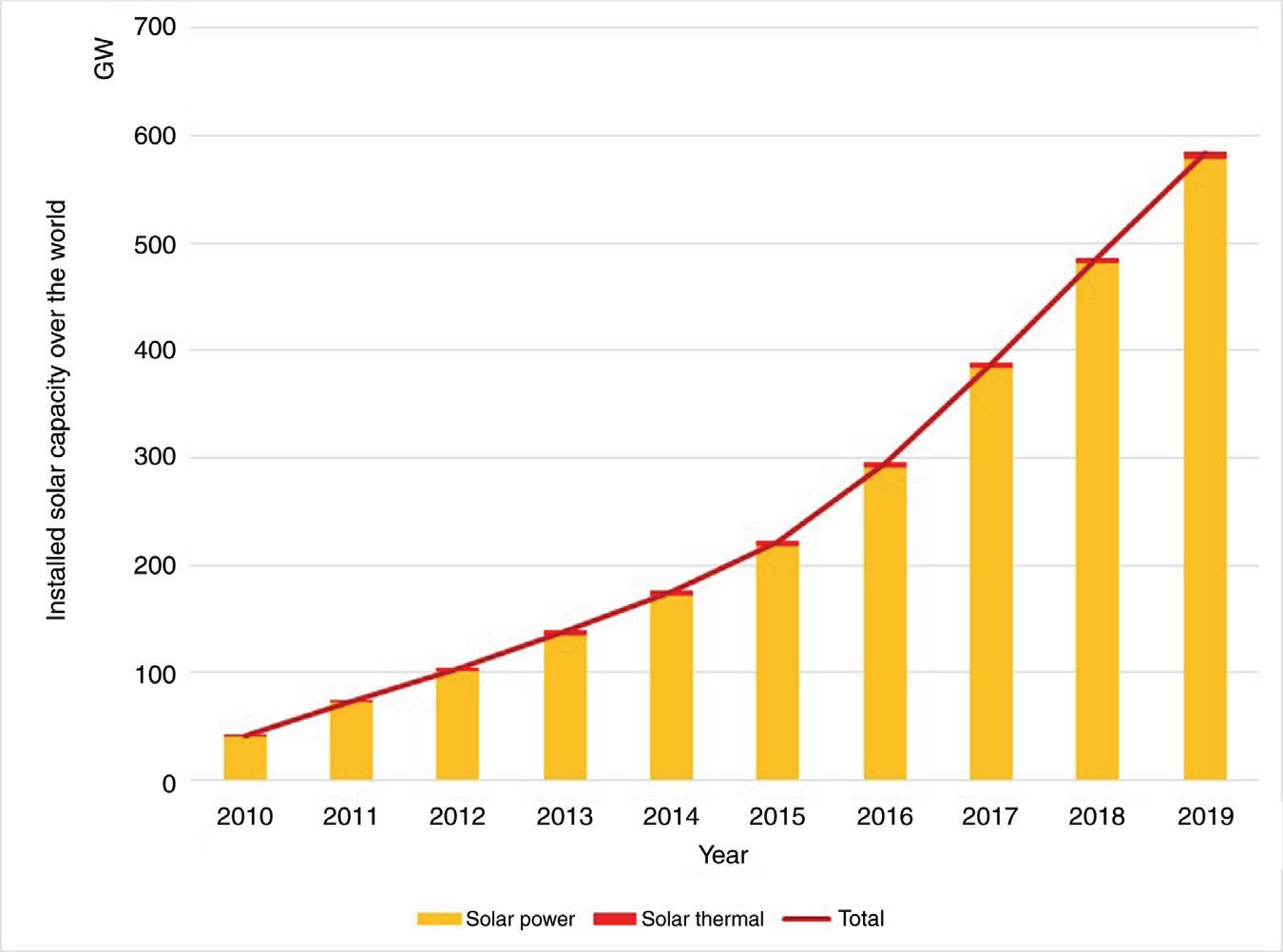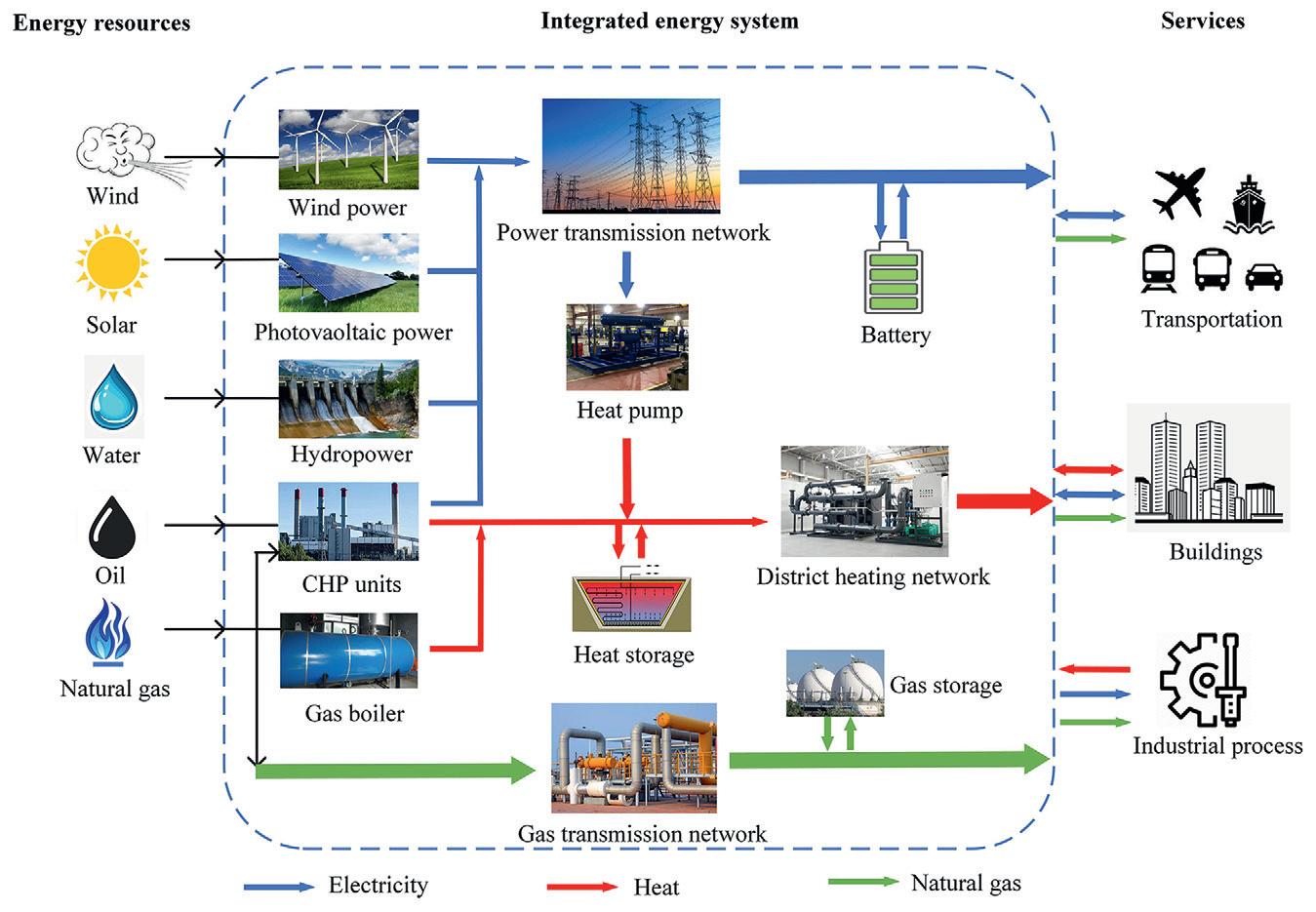OPTIMALOPERATION OFINTEGRATED MULTI-ENERGY SYSTEMSUNDER UNCERTAINTY
QIUWEIWU
AssociateProfessor,TechnicalUniversityofDenmark,Denmark
JINTAN
PhDcandidate,TechnicalUniversityofDenmark,Denmark
MENGLINZHANG
Postdoctoralresearcher,TechnicalUniversityofDenmark,Denmark
XIAOLONGJIN
Postdoctoralresearcher,TechnicalUniversityofDenmark,Denmark
ANATURK
PhDcandidate,TechnicalUniversityofDenmark,Denmark
Elsevier
Radarweg29,POBox211,1000AEAmsterdam,Netherlands
TheBoulevard,LangfordLane,Kidlington,OxfordOX51GB,UnitedKingdom 50HampshireStreet,5thFloor,Cambridge,MA02139,UnitedStates
Copyright©2022ElsevierInc.Allrightsreserved.
Nopartofthispublicationmaybereproducedortransmittedinanyformorbyanymeans, electronicormechanical,includingphotocopying,recording,oranyinformationstorage andretrievalsystem,withoutpermissioninwritingfromthepublisher.Detailsonhowto seekpermission,furtherinformationaboutthePublisher’spermissionspoliciesandour arrangementswithorganizationssuchastheCopyrightClearanceCenterandthe CopyrightLicensingAgency,canbefoundatourwebsite: www.elsevier.com/permissions.
Thisbookandtheindividualcontributionscontainedinitareprotectedundercopyright bythePublisher(otherthanasmaybenotedherein).
Notices
Knowledgeandbestpracticeinthisfieldareconstantlychanging.Asnewresearchand experiencebroadenourunderstanding,changesinresearchmethods,professionalpractices, ormedicaltreatmentmaybecomenecessary.
Practitionersandresearchersmustalwaysrelyontheirownexperienceandknowledgein evaluatingandusinganyinformation,methods,compounds,orexperimentsdescribed herein.Inusingsuchinformationormethodstheyshouldbemindfuloftheirownsafety andthesafetyofothers,includingpartiesforwhomtheyhaveaprofessionalresponsibility.
Tothefullestextentofthelaw,neitherthePublishernortheauthors,contributors,or editors,assumeanyliabilityforanyinjuryand/ordamagetopersonsorpropertyasamatter ofproductsliability,negligenceorotherwise,orfromanyuseoroperationofanymethods, products,instructions,orideascontainedinthematerialherein.
BritishLibraryCataloguing-in-PublicationData
AcataloguerecordforthisbookisavailablefromtheBritishLibrary LibraryofCongressCataloging-in-PublicationData
AcatalogrecordforthisbookisavailablefromtheLibraryofCongress
ISBN:978-0-12-824114-1
ForInformationonallElsevierpublicationsvisitourwebsiteat https://www.elsevier.com/books-and-journals
Publisher: JoeHayton
AcquisitionsEditor: GrahamNisbet
EditorialProjectManager: SaraValentino
ProductionProjectManager: KameshRamajogi
CoverDesigner: ChristianJ.Bilbow
TypesetbyAptara,NewDelhi,India
1.Introductionofintegratedenergysystems1
1.1 Introduction1
1.2 Integratedenergysystem5
1.3 CurrentstatusofintegratedenergysystemsinChinaandDenmark9
1.4 Recommendationsforfurtherdevelopmentofintegratedenergysystems11
1.5 Conclusion12 References13
2.Mathematicalmodelofmulti-energysystems17
2.1 Introduction17
2.2 Modelingofcouplingdevices19
2.3 Mathematicalmodelofthedistrictheatingnetwork23
2.4 Mathematicalmodeloftheelectricpowernetwork30
2.5 Modelingofthenaturalgassystem31 References50
3.Uncertaintymodeling55
3.1 Introduction55
3.2 Scenariogenerationwithspatial-temporalcorrelationsinSO57
3.3 Partition-combineuncertaintysetmodelinginRO63
3.4 Casestudy68
3.5 Conclusion76 References76
4.Optimaloperationofthemulti-energybuildingcomplex79
4.1 Introduction79
4.2 ConfigurationofaBC81
4.3 PMIBwiththeHVACsystem83
4.4 Formulationofthehierarchicalmethod91
4.5 Resultsanddiscussions96
4.6 Conclusion107 References108
5.MPC-basedreal-timedispatchofmulti-energybuildingcomplex111
5.1 Introduction111
5.2 ConfigurationandmodelingoftheBC114
5.3 Themulti-timescaleandMPC-basedschedulingmethod119
5.4 Resultsanddiscussions127
5.5 Discussions140
5.6 Conclusion141 References141
6.Adaptiverobustenergyandreserveco-optimizationofan integratedelectricityandheatingsystemconsidering winduncertainty145
6.1 Introduction145
6.2 Mathematicalformulationofadaptiverobustenergyandreserve co-optimizationfortheIEHS147
6.3 Solutionmethodology157
6.4 Simulationresults160
6.5 Summaryandconclusion167 References167
7.Decentralizedrobustenergyandreserveco-optimizationfor multipleintegratedelectricityandheatingsystems171
7.1 Introduction171
7.2 StructureanddecentralizedoperationframeworkofmultipleIEHSs173
7.3 Mathematicalformulationofdecentralizedrobustenergyandreserve co-optimizationformultipleIEHSs176
7.4 Solutionmethodology181
7.5 Simulationresults185
7.6 Conclusion192 References193
8.Chance-constrainedenergyandmulti-typereservesscheduling exploitingflexibilityfromcombinedpowerandheatunits andheatpumps195
8.1 Introduction195
8.2 Frameworkofchance-constrainedtwo-stageenergyandmulti-type reservesscheduling197
8.3 PrimaryFRRandfollowingreserveprovisionfromCHPunitsandHPs198
8.4 Mathematicalformulationofdecentralizedrobustenergyandreserve co-optimizationformultipleIEHSs204
8.5 Reformulationasamixed-integerlinearprogram211
8.6 Simulationresults213
8.7 Conclusion219 References219
9.Day-aheadstochasticoptimaloperationoftheintegratedelectricity andheatingsystemconsideringreserveofflexibledevices221
9.1 Introduction221
9.2 Two-stagestochasticoptimaldispatchingschemeoftheIEHS223
9.3 ReserveprovisionandheatregulationfromcondensingCHPunits225
9.4 MathematicalformulationofstochasticoptimaloperationoftheIEHS228
9.5 Casestudy238
9.6 Conclusion246 References246
10.Two-stagestochasticoptimaloperationofintegrated energysystems249
10.1 Introduction249
10.2 BackgroundandDAscheduling249
10.3 MathematicalmodeloftheIESfortwo-stageDAscheduling254
10.4 Scenariogenerationandreductionmethod270
10.5 Exampleofacasestudy276
10.6 Conclusion290 References291
11.MPC-basedreal-timeoperationofintegratedenergysystems295
11.1 Introduction295
11.2 BackgroundandRTscheduling296
11.3 MPC-basedRTscheduling302
11.4 MathematicalmodelsoftheIESforMPC-basedRTscheduling308
11.5 Solutionprocessandcasestudy319
11.6 Simulationresults322
11.7 Conclusion333 References334
AppendixA:Basicsofstochasticoptimization337
A.1 Stochasticoptimizationfundamentals338
A.2 Scenariogenerationandreduction342
A.3 Generalformulationoftwo-stageoptimization345 References346
AppendixB:Introductiontoadaptiverobustoptimization349
B.1 FormulationofAROwithresource350
B.2 Solutionmethodology350 References353 Index 355
Biography
QiuweiWu receivedthePhDdegreeinPowerSystemEngineeringfrom NanyangTechnologicalUniversity,Singapore,in2009.Hewasasenior R&DengineerwithVestasTechnologyR&DSingaporePteLtdfromMar. 2008toOct.2009.HehasbeenworkingatDepartmentofElectricalEngineering,TechnicalUniversityofDenmark(DTU)sinceNov.2009(PostDoc Nov.2009-Oct.2010,AssistantProfessorNov.2010-Aug.2013,Associate ProfessorsinceSept.2013).HewasavisitingscholarattheDepartment ofIndustrialEngineering&OperationsResearch(IEOR),Universityof California,Berkeley,fromFeb.2012toMay2012.Hewasavisitingscholar attheSchoolofEngineeringandAppliedSciences,HarvardUniversity fromNov.2017Oct.2018.Hisresearchinterestsareoperationandcontrol ofpowersystemswithhighpenetrationofrenewables,includingwind powermodellingandcontrol,activedistributionnetworks,andoperation ofintegratedenergysystems.
JinTan receivedtheM.S.degreefromtheDepartmentofElectrical Engineering,WuhanUniversity,Wuhan,China,in2018.Sheisworking towardthePh.D.degreeinelectricalengineeringfromTechnicalUniversity ofDenmark,KongensLyngby,Denmark.Herresearchinterestsincludethe optimaloperationofintegratedelectricityandheatingsystemandrenewable energyintegration.Currently,sheisinvolvedintheprojectofUsingFlexible DistrictHeatingwithHeatPumpsforIntegratedElectricityandHeatDispatchwithRenewables.Shefocusesonmodelingtheintegratedelectricity andheatingsystem,investigatingtheflexibilitythatdistrictheatingsystem couldprovidetotheelectricpowersystem,andtheoptimaloperationforthe integratedelectricityandheatsystemconsideringwindpoweruncertainty.
MenglinZhang receivedtheB.S.degreeinelectricalengineeringfrom SouthwestJiaotongUniversity(SWJTU),Chengdu,China,in2011,and thePh.D.degreeinelectricalengineeringfromWuhanUniversity(WHU), Wuhan,China,in2017.ShewaswiththeDepartmentofElectricalEngineering,HuazhongUniversityofScienceandTechnology(HUST),Wuhan, Chinafrom2017to2019.Currently,sheisaPost-DoctoralResearcher withtheCenterforElectricPowerandEnergy,TechnicalUniversityof Denmark(DTU).Hercurrentresearchinterestsincludethemodelingof
temporal-spatialcorrelationofrenewablesinstochasticprogrammingand advanceduncertaintysettoreduceconservativenessinrobustoptimization, themodelingofoptimaloperationofintegratedelectricityandheatsystem consideringflexibility,andtheacceleratedsolvingalgorithmforthebulk system.
XiaolongJin obtainedthePh.D.degreefromtheSchoolofElectricaland InformationEngineering,TianjinUniversity,Tianjin,China,in2019.Heis nowaPostdocresearcherwithTechnicalUniversityofDenmark(DTU). Hisresearchinterestsincludeenergymanagementofmulti-energysystems andmulti-energybuildings.Specifically,hisresearchfocusesonimproving energyefficiencyandreducingoperatingcostofmulti-energysystems andmulti-energybuildingswithdesignedenergymanagementframeworks, whichusestheflexibilitiesfromthreeaspects:1)Usethedemand-side flexibilitybydispatchingtheflexiblemulti-energyloadsinsmartbuildings; 2)Usethenetwork-sideflexibilitybycoordinatingthemulti-vectorenergy networks;3)Usethesupply-sideflexibilitybyschedulingthevarious generationsintheenergystationsandthedistributedenergyresources connectedwithmulti-energysystemsandmulti-energybuildings.
AnaTurk receivedtheB.S.degreefromtheFacultyofElectricalEngineeringandComputerScienceatUniversityofMariborinSlovenia andMScdegreeinEnergyEngineeringfromFacultyofEngineering andScienceatAalborgUniversityinDenmarkin2018.Sheiscurrently pursuingaPh.D.attheCenterofElectricPowerandEnergy(CEE)at theDepartmentofElectricalEngineeringattheTechnicalUniversityof Denmark(DTU).Herresearchinterestincludeintegrationandmodelingof multi-energysystems(districtheating,naturalgasandelectricpowersystem), stochasticprogrammingandoptimaloperationandschedulingofmultienergysystems.Inparticular,specialfocusisonoptimaloperationandreal timecontrolofintegratedenergysystemsbyusingmodelpredictivecontrol.
Introductionofintegrated energysystems
1.1Introduction
Energyplaysanimportantroleinthedevelopmentofsociety.Beforethe industrialrevolution,biomass(i.e.,wood)wastheworld’smainprimary energysource.Since1900,mostprimaryenergycamefromwoodand coal [1],butwiththeadventoftheautomobileandairplanesinthe early20thcentury,oilbecamethedominantfuel.In2018,mostofthe world’senergywasgeneratedfromfossilfuels(81%).Therestcamefrom bioenergy,includingtraditionalsolidbiomass(9.4%),nuclear(5%),hydro (2.5%),andotherrenewablessuchaswind,solar,andgeothermal(2.1%) [2] Inrecentyears,withgrowingenvironmentalconcerns,especiallyoverglobal climatechangeandlocalpollution,attentiontointernationalagreementsfor reducinggreenhousegasemissionsandcleaningair,withaconsequential increaseofrenewableenergytechnologies,hasincreased.TheEuropean Unioniscommittedtoreducinggreenhousegasemissionstobe80%to 95%below1990levelsby2050,andabouttwothirdsoftheenergyshould befromtherenewablesources [3].IntheUnitedStates,arenewableenergy transitionisunderway,ledbycommunitiesandstates [4].Denmarkhasbeen apioneerinimplementingrenewableenergy,andtheDanishenergysystem hasundergoneatransformationalchange,whereasChinarankedfirstinthe worldintermsofcumulativeandnewinstallationsofonshorewindpower by2018 [5].
Sincemajorrenewablesourceslikewindandsolarcaneasilybeturned intoelectricity,andelectricpowercaneasilybetransmitted,transformed,and used,suchresourcesareexpectedtobecomethedominantenergycarriers inthefuture.Inrecentyears,windpowerandphotovoltaic(PV)powerhave beengrowingrapidlyinmanycounties. Fig.1.1 showstheinstalledwind powercapacityfrom2010to2019,whichreachedabout622GWin2019 [6].China’scumulativeinstalledwindpowercapacityfrom2004to2019 isillustratedin Fig.1.2,whichreachedabout236GWinthelatteryear, accountingforalmost36%oftotalinstalledwindcapacityworldwide [8].It isestimatedthatmorethan25%ofnewoffshorewindpowercapacitywillbe
Figure1.1 Installedwindpowercapacityovertheworldfrom2010to2019.From InternationalRenewableEnergyAgency [6].
Figure1.2 CumulativeinstalledwindpowercapacityinChina.FromHeetal. [7]. addedinChinaby2030 [9].InDenmark,cumulativewindpowercapacity was6.13GWin2019,withonshoreandoffshorewindturbinecapacities reaching4.43GWand1.70GW,respectively [10].Inaddition,windpower productionaccountedfor47.2%ofDenmark’sdomesticelectricitysupply.
Figure1.3 Proportionofonshoreandoffshorewindpowerandthetotalwindpower shareforelectricitysupplyinDenmark.
Fig.1.3 showstheproportionofonshoreandoffshorewindpower,aswell asthetotalwindpowershareofelectricitysupplyinDenmarkfrom2011 to2019.Meanwhile,solarpowerandsolarthermalenergyhaveexperienced stronggrowthinthepasttwodecades. Fig.1.4 showstheinstalledsolarpower andsolarenergycapacityfrom2010to201,whichreachedabout585GW in2019 [11]
Itshouldbenotedthatthepoweroutputofrenewabletechnologies likewindandsolarPVfluctuatesduetorapidlychangingmeteorologicalconditions.Becausetheyhaveazeromarginalcost,renewablepower fromwindandPVisreplacingconventionalthermalpowerplants,which conventionallyhavebeenresponsibleforprovidingmanyelectricalpower systemservices,suchasreserves,voltagecontrol,frequencycontrol,stability services,andblackstartrestoration [11].Theincreasingpenetrationof theserenewablepowersourcesisthereforeposingsubstantialchallengesto theplanning,secureandreliableoperation,andcontrolofpowersystems [12], [13].Hence,therequirementsforflexibilitytoaccommodatelarge amountsofnaturallyfluctuatingrenewableenergyareincreasing.
Inseveralcountriesandregions,partsofthegas,heating,cooling,and transportationsystemshaverespondedtotheseflexibilityrequirementsby meansofadeepcouplingofmultipleenergysectors.Indeed,duetothe intrinsicstoragecapabilitiesof,forexample,thethermalinertiaofdistrict heatingpipesandbuildings [14],thestorageofelectricvehiclebatteries [15],
Figure1.4 Installedsolarcapacityovertheworldfrom2010to2019.FromInternational RenewableEnergyAgency [11].
andvariousenergyconversiontechniques(e.g.,power-to-heat,power-togas[P2G],combinedheatandpower[CHP]units),theheatingandgas sectorscanprovideextraflexibilitytotheelectricpowersystem(EPS). Differentenergysectorsarecoupledattheproductionordemandside.
Theintegrationofdifferentenergysectorscansolvesomechallenges tothestableandreliableoperationofelectricpowersystemswithhigh penetrationsofrenewableenergy [16].Thiswillnotonlyfacilitatethe integrationofrenewableenergybutalsocanimprovethecostefficiency ofthewholeenergysystemifdoneproperly.InDenmark,Energinetisthe transmissionsystemoperatorofthecountry’selectricityandgastransmission grids [11],which,bycontrollingbothwholesalegridsystems,basically demonstratestheintegrationoftwodifferentenergysystems.Inaddition,the DanishPartnershipSmartEnergyNetworkswasestablishedin2014tobring togetherDanishenergycompanies,industry,andknowledgeinstitutions withinelectricity,heating,cooling,andgas.Thispromisestobeaneffective approachforachievingtheambitiousDanishclimateandenergygoalofa fully100%renewable-basedenergysystemby2050.
Inadditiontotheintegrationofinfrastructuraltechnology,coordinatedoperationandcontrolofanintegratedenergysystemarenecessary [17], [18].Atpresent,inmostcountries,theregulationandmanagement ofdifferentenergysectorsarestillseparatebothforhistoricalreasonsand duetothedifferentsetsofrulesbasedondiverseprinciples.Thislackof uniformstandardizationimpedesthedevelopmentofefficientintegration andoptimalsolutionsforthewholesystem.Well-functioningandefficient integratedenergysystemsshouldbebasedonanintegratedenergysystem approachthatincorporatesnoveldigitalsolutions,includingsensorsand actuatorsembeddedinthesystem,variousInternettechnologies,platforms withservice-baseddesigns,andnovelbusinessmodels [19],butthiscanonly workeffectivelyifthecross-sectorregulationsarecompatible.
Duringthepastfewdecades,theconceptofthesmartgridhasemerged. ItinvolvesnewconceptsandtechnologiesintheEPS.TheEuropean UnionCommissionTaskForceforSmartGridsdefinesthesmartgridas “anelectricitynetworkthatcancost-efficientlyintegratethebehaviorand actionsofallusersconnectedtoit—generators,consumers,andthosethat doboth—inordertoensureaneconomicallyefficient,sustainablepower systemwithlowlossesandhighlevelsofqualityandsecurityofsupplyand safety.”Theideaofthesmartgridcanbeextendedtosmartenergy,whereby informationandcommunicationtechnologyalsoplayanimportantrolein enhancingtheperformanceofthecoordinatedoperationandcontrolofall ofthecoupledenergysectors [20].
1.2Integratedenergysystem
An integratedenergysystem isdefinedasacost-effective,sustainable,andsecure energysysteminwhichrenewableenergyproduction,infrastructure,and consumptionareintegratedandcoordinatedthroughenergyservices,active users,andenablingtechnologies. Fig.1.5 givesanoverviewofaDanishintegratedenergysystemprovidingflexibilityforthecost-effectiveintegration ofrenewableenergies.Thedifferentcharacteristicsofthecoupledelectricity, heating,andgasenergysectorsinintegratedenergysystemsarelistedin Table1.1.
1.2.1Electricitysector
TherewillbemorenaturallyfluctuatingpowergenerationintheEPS,which canflowbi-directionally,fromlarge-scalegeneratorsviathegridtothe
Figure1.5 Overviewofanintegratedenergysystem.
Table1.1 Differentcharacteristicsofvariousenergysectors.
Energy
Sector Properties
Electricity Long-distancetransport
IntrinsicFlexibility Flexibility Need
Verylow(seconds) High Lowlosses
Easytogeneratefromrenewable energysources
Easyconversiontootherenergy carriers
Heating Local/district
Mediumlosses
Difficulttoconverttoother energycarriers(iflow temperature)
Gas Long-distancetransport
Lowtransmissionlosses
Intrinsiclossesduringconversion atthepointofuse
Easytoconverttoheatand electricity
FromLundetal. [27]
Medium(days) Medium
High(months) Low
consumer,andbereinjectedbyprosumersintothegrid.Inaddition,over time,small-scaledistributedgenerationandfluctuatingrenewablegenerationwillgraduallyreplaceconventionalcentralpowerplants.Sincethe traditional(large-scale)synchronouselectricitygenerationunitsthatprovide inertiaresponsearebeingreplacedbynonsynchronousrenewableenergy technologies(effectivelyviapowerelectronicsinverters),thetotalinertia inthesystemisbeingreduced,leadinginturntoadverseimpactsonthe frequencysecurityoftheEPS.Thisconsiderablyincreasestherequirement forflexibility,especiallyfrequencycontrolreserves,tomaintainsystemfrequencysecurity.Toobtainadditionalflexibilitytosupporttheoperationand controloftheEPS,newenergyconversiontechniques,demandresponse,and newpowergenerationschedulingstrategiesarebeingintroducedintothe electricitysector.Theconversiontechniquesincludethestillconventional gas-firedelectricpowerplants(gastopower)andcogenerationplants(gas toheatandelectricalpower),aswellasheatpumps(electricpowertoheat) andfuturetechnologiesthatconvertelectricalenergyintomoleculessuch ashydrogenandmethane(P2G) [21].Bypromotingappropriateinteraction betweenelectricpowergenerationandactiveconsumers(includingcommercial,industry,andresidential),demandresponsecanoffergreatbenefitsto operationofthesystem [22].Theelectricalloadsarecontrolledbyintelligent managementsystemsparticipatingintheelectricitymarkets.Asanexample, intheEuropeanUnion–supportedprojectEcoGridEU,flexibilityonthe consumersideissupposedtooriginatemainlyfromlocalheatingsystemsin buildings [23].
1.2.2Heatingandcoolingsector
Withthefurtherdevelopmentoflow-energybuildings,residentialand officeenergyconsumption,includingheatingandcoolingdemand,willfall correspondingly.Bydevelopingmoredistrictheatingandcoolingsystems whereappropriateandjustified,itispossibletomovetowardamore sustainableenergysystembasedonrenewableenergy [24].Inthisregard, theconceptofa4thGenerationDistrictHeatingSystem(4GDH)was proposedinDenmark [25],whereasthe5thGenerationDistrictHeating System(5GDH)wasdevelopedfurther,alsoknownasColdDistrictHeating Networks [26].Thesesystemsarebasedontheideaoflow-temperatureand ultra-low-temperaturedistrictheatingsystems(DHSs)respectively,which canreusethewasteheatfromindustryandbuildings,aswellasreduce heatloss.Theheatingnetworksin4GDHarecharacterizedbynormal
distributiontemperaturesof50◦ C(supplypipe)and20◦ C(returnpipe)as annualaverages,whereasthetemperaturesinpipeswith5GDHarearound 5to30◦ C,whichkeepsheatlosstoaminimumandreducestheneedfor extensiveinsulation.In5GDH,electricalheatboostersareusuallyinstalledat thebuildingsideforheatinghottapwater.Inaddition,heatstorageisplaying anincreasinglyimportantroleintheheatingsector,whichcanenhancethe flexibilityofCHPunitsandintegratefluctuatingwindpowerbetterthrough theconversionofelectricalenergyintoheat.
1.2.3Naturalgassector
Duetothelowcostoftheenergycarrier,lowenvironmentalemissions,and highefficiencyofnaturalgas–basedtechnologies,naturalgashasbecome thesecondlargestsourceoftheworldenergyconsumption [5].Ontheone hand,gascaneasilybeconvertedintoelectricityandheatbygas-firedpower generation,suchascombinedcyclegasturbines,high-efficiencycondensing boilers,andCHP.CHP(orco-generation)intensifiesthecouplingbetween naturalgasandelectricitypowersystems.Ontheotherhand,withthe hopefullysuccessfulfuturedevelopmentofP2Gtechnology,electricpower canalsobeconvertedintogas(hydrogenandmethane),andthenthe convertedgascanbeinjectedintothenaturalgassystemtogetherwithbiogas [28].Itshouldbenoted,however,thatalthoughtheoverallefficiencyofthis processisquitelow,itmayneverthelessbeanecessarybuildingblockin achievingtherequiredsystemintegrationbetweensectorstoensurelongtermstorage.TheP2Groutecanhelpdecreasethecurtailingofrenewable energiesandprovidemoreflexibilityfortheEPS.Furthermore,thenatural gassystemhaslarge-scalestoragecapabilitiesduetothepressureflexibility andthelargevolumesinpipelinesandcaverns [11]
1.2.4Transportationsector
TheEuropeanEnvironmentalAgency,whichkeepstrackofworldwide finalenergyconsumption,hasfoundthatthetransportsectorisresponsible foraboutathirdofoverallfinalenergyconsumption [29].Thus,because oftheaccompanyingCO2 emissionsandlocalpollution,itiscrucialthat thetransportationsectorreplacesfossilfuelswithrenewable-basedenergy carriers [30].Theelectrificationoftransportationthroughbatteryelectric vehicles(BEVs)andfuelcellhybridelectricvehiclesarepromisingtechnologies,sincetheycanreducefossilfuelconsumption,aswellasenhancethe integrationofnaturallyfluctuatingrenewableenergies.Forinstance,BEVs
canbechargedanddischargedatdifferenttimesandlocations.Thus,itis treatedasaflexibleload(G2V)andstorageinthepowersystem,whichcan changetheloadbothintimeandspace [31].Meanwhile,BEVscandischarge electricpowertothepowersystemlikegenerationunitsthroughvehicle togrid(V2G)technology.Withtheproperdesignandcontrolstrategies, BEVscanprovidemultipleancillaryservicestothepowersystem,suchas frequencyresponse [32].
1.2.5Operationofintegratedenergysystems
Theoptimaloperationandsmartcontrolofintegratedenergysystemscan improvethesustainability,reliability,andcostefficiencyofthewholesystem. Takingintoaccountdiverseenergyconversiontechnologiesandthecoordinationofdifferentenergysectors,theenergyservicesrequiredbycustomers orsystemoperatorscanbeprovidedinmanydifferentways.Withcentralized control,theentiresmartenergysystemisgenerallymanagedbyasingle operator,andoverall,theappropriateoperationconstitutesalarge-scale centralizedproblem,whichismorecomplicatedthanwithanindividual system.Toimprovecomputationefficiencyandprotectinformationprivacy, distributedordecentralizedsolutionsaredesiredtoachieveindependent yetcoordinatedoperation [33].Inaddition,therewillbequitealotof localcontrolviaintegratorsandaggregators,whichalsorequiresdistributed operationandcontrol.Apartfromtheaforementionedtechnicalaspects,a propermarketdesignwiththerightincentivesandclear(i.e.,stimulatingand nomutuallyopposing)regulationswillberequiredtoensuretheeffective operationofintegratedsmartenergysystemsaswell.
1.3CurrentstatusofintegratedenergysystemsinChina andDenmark
Duringtheperiodofthe12thFive-YearPlan(2011–2015),coalconsumption inChinafellby5.2%andtheconsumptionofnon-fossilfuelsincreasedby 2.6% [34].Before2006,electricitygenerationcamemainlyfromconventionalthermalpowerunitsandhydropowerunits.ToreduceCO2 emissions, powergenerationfromrenewablesourcesofenergysuchaswind,solar, andhydrohasdevelopedrapidlyinChinaduringthepastdecade.Itis expectedthatCO2 emissionswillpeakataround2030andthatthenonfossil-fuelshareofprimaryenergywillincreaseby20%bythesameyear [35].Moreover,theChinesegovernmenthasrecentlyannouncedatargetof
achievingcarbonneutralityby2060.Inaddition,duetoitshigherconversion efficiencyandlowerenvironmentalemissions,naturalgashasattracted increasingattention,expectingtoreach15%oftotalfuelconsumptionin thewholeenergysectorby2030.InnorthernChina,theDHSisbeing adoptedtosupplyheattoconsumers.TheCHPunitsandheatboilerscover 62.9%and35.7%ofheatingproduction,respectively,withtherestmainly beingsuppliedbyindustrywasteheatandgeothermal.However,theelectric powerandheatgenerationofCHPunitsdependsonheatloads,whichlimits theoperationalregionoftheCHPunits.CHPunitsmustrunwhentheheat isneeded,leadingtoahighcurtailmentofwindpowerinthewinter.
Since2015,theNationalEnergyAdministrationofChinahasissuedseveralpoliciestosupportthedevelopmentofintegratedenergy systems,includingmicrogridswithhighrenewablepenetrationandan overallintegratedenergysystem,referredtoastheEnergyInternet (http://www.nea.gov.cn/).TheStateGridTianjinElectricityPowerCompanyisthefirstcompanytoconductdemonstrationprojectsofintegrated energysystems,whichwouldachievecoordinatedmanagementandcontrol oftheelectricity,heating,andcoolingfluxesandflows.Theintegrated energysystem,ifdoneproperly,improvesthecostefficiencyofthewhole systemandreducesCO2 emissions.TheStateGridJiangsuElectricity PowerCompanyhascompletedademonstrationprojectofadistrictsmart energysystemwith70%penetrationofrenewables,whichincorporatesthe electricity,heating,cooling,andtransportationenergysectors.Inaddition, theChinaSouthernPowerGridhasinvestigatedhowtodesignandoperateasmartenergysystemthatincludestheelectricity,heating,gas,and transportationenergysectors.However,atpresent,theEPS,DHS,andgas systemsareoperatedbydifferententitiesinChinaandarethusplanned individually.
In2018,electricityfromrenewablesaccountedfor60%ofDenmark’s domesticelectricitysupply,andwindpoweraccountedfor40% [36].In particular,thetransitionfromfossilfuelstorenewableenergyfordistrict heatingissignificantinDenmark.Thepercentageofrenewablescovered 60%ofdistrictheatingproductionin2018 [36].Apartfromsecuring adequatecapacitythroughtheconnectionwithneighboringcountries,the heatingsectorinDenmarkplaysamajorroletoprovideflexibilityforthe EPSinintegratingfluctuatingwindpower.Theheatingandelectricity sectorsarecoupledthroughCHPplants,whichgeneratearound70%of thermalenergyintheDanishDHS.Sincetheelectricitytaxisbeingreduced graduallyovertime,electricboilersandheatpumpshaveattractedincreasing
attention.Combinedwiththeelectricboilers,heatpumps,andheatstorage, CHPunitscanprovidemoreflexibilitytotheEPS.
Tofacilitatetheintegrationofwindpower,Denmarkhasconductednumerousresearchprojectsonfutureintegratedenergysystems.Forexample, theEnergyLabNordhavnprojectisademonstrationprojectforadenseand integratedfutureenergysystem.Itdemonstrateshowelectricityandheating, energy-efficientbuildings,andelectrictransportationwiththeinnovative useofdataandanalyticscanbeintegratedintoanintelligent,flexible,and optimizedenergysystem [37].Alow-temperaturedistrictheatingsystem incorporatingsmartenergynetworktechnologies,heatstorage,energyflexiblebuildings,decentralizedsupplyoptions,andfuel-shiftsolutionshas beendeveloped.IntheCopenhagenNordhavnarea,activeparticipationby occupantsofthelow-energybuildingsactingasagileconsumersandusers, andthereforebecomingactiveenergy-flexibleelements,hasbeeninvestigated.Anotherproject,CentreforIT-IntelligentEnergySystems(CITIES), hasdevelopedmethodologiesanddigitalsolutionsfortheanalysis,operation, anddevelopmentofintegratedurbanenergysystems,withtheultimate aimofachievingindependencefromfossilfuelsbyutilizingtheflexibility oftheenergysystemthroughintelligence,integration,andplanning [38]. TheEnergyPlantoolhasbeendevelopedbyAalborgUniversitytodesign a100%renewableenergysystemthatincludeselectricity,heating,cooling, transportation,andindustrialsectors.TheEnergyPlantoolisinvestigating themodelingofallrelevantenergygenerationunits,energystorage,and energyconversiontechnologies [39].
1.4Recommendationsforfurtherdevelopmentof integratedenergysystems
Anefficienttransitiontoasmartenergysystemrequiresintensiveresearch anddevelopmenteffortsregardingtheintegrationofvariousenergyconversiontechniques,systemoperationframeworks,digitalization,andcommunicationsystems,amongothers.Thefollowingsuggestionsforfurtherresearch intoanddevelopmentofintegratedenergysystemsarerecommended: Investigatenewoptimaloperationframeworksandcontrolstrategiesformultiple energysystems.Giventhefactthatvariousenergysectorsaremanagedby differententitiesandthatthecoordinationofdifferentenergysectorsis insufficientatpresent,researchshouldbeconductedtocoordinatevariousenergysectorswithdifferentoperationaltimescalesandcharacteristicswhilerespectingtheprivacyofdifferententities.Thedevelopmentof
Optimaloperationofintegratedmulti-energysystemsunderuncertainty
integratedenergysystemsshouldfocusonprovidingsecureandreliable energyservicestoendusers.
Designmulti-energycarriermarketsanddevelopnewbusinessmodelframeworks. Todistributesmartenergysystemcostsandbenefitsacrossenergysectors andservicesefficiently,newregulationsandbusinessmodelsshould bedeveloped.Acorrespondingdemonstrationactingasoperational platformsfornewbusinessmodelsisneeded.Inaddition,theincentives neededforenergyconsumersandbuildingmanagementtoadoptflexible consumptionshouldbeexplored.
Developsolutionsforthemoreefficientintegrationofenergystorageandadvanced energyconversiontechnologiestoaccommodatethegrowthinfluctuatingrenewable energy.Optimaloperationandsmartcontrolofthevariousenergyinfrastructuresshouldbeinvestigatedindepth,enablingadditionalflexibility acrosstheseinfrastructurestoefficientlybalanceandutilizerenewable energy,mainlyintegratedintothepowersystem.
Designanddeveloplow-energybuildingsforagreentransition.Buildingsplay animportantroleasthemainconsumersincities.Togetherwithindoor climatesandthermalinertia,thepotentialflexibilityofbuildingscan beutilized.Advancedbuildingenergymanagementandcontrolsystems shouldbedevelopedtointeractwiththe(external)smartenergysystem andincreaseenergyflexibility.
Developintegrateddesignandplanningmethodsacrossenergysectorsforintegratedenergysystems.Atpresent,therearenonationalpoliciesand regulationsregardingintegratedenergysystemsineitherChinaor Denmark.Thecoordinateddesignandplanningshouldevolvetoremove thebarriersbetweenthedifferentenergysectorsandfacilitatethe deploymentofsmartenergysolutions.
1.5Conclusion
Cross-sectorintegratedenergysystemswillbedevelopedovertheworldto copewiththefluctuationsanduncertaintyfromrenewablesinanefficient way.Theintegratedenergysystemwillbethemostefficientsolution toincreasetheenergyefficiencyofsystemsandreduceenvironmental emissions.Thischapterdescribedtheconceptoftheintegratedenergy system,integratingtheelectricity,heating,cooling,gas,andtransportation sectorswithhighrenewableenergypenetration.Thedifferenttimescales andcharacteristicsofthedifferentenergysectorscreatechallengesforthe coordinatedoperationofthedifferentenergysectors.Manyprojectshave
beenconductedtodemonstratetheeconomicandenvironmentalbenefits ofintegratedenergysystems.Furtherresearchanddevelopmentarerequired todealwiththechallengestothegreentransitiontowardasmartenergy system,includingadvancedtechnologies,novelmarketdesignsandbusiness models,andconsistentnationalregulationstoremovethebarriersbetween thedifferentenergysectors.
References
[1]VSmil,EnergyTransitions:History,Requirements,Prospects,PraegerPublishers,West Port,CT,2010.
[2]InternationalEnergyAgency,Worldenergyoutlook2019,2019. https://www.iea. org/reports/world-energy-outlook-2019.(Accessed16April2021).
[3]EuropeanUnion.Energyroadmap2050,2012. https://ec.europa.eu/energy/sites/ener/ files/documents/2012_energy_roadmap_2050_en_0.pdf.(Accessed16April2021).
[4]UCLALuskinCentreforInnovation,Progresstoward100%cleanenergy:incitiesand statesacrosstheU.S.,2019. https://innovation.luskin.ucla.edu/wp-content/uploads/ 2019/11/100-Clean-Energy-Progress-Report-UCLA-2.pdf.(Accessed16April2021).
[5]YHe,MYan,MShahidehpour,ZLi,CGuo,LWu,etal.,Decentralizedoptimizationof multi-areaelectricity-naturalgasflowsbasedonconereformulation,IEEETransPower Syst33(4)(2018)4531–4542.
[6]InternationalRenewableEnergyAgency,Windenergy. https://www.irena.org/wind (Accessed16April2021).
[7]ZHe,DDrozdov,JWang,WShen,CLi,WLi,Competitivenessofthewindpower industryinChina:ananalysisbasedontheextendedDiamondModel,JRenewSustain Energy12(2020)052701.
[8]GlobalWindEnergyCouncil,Globalwindreport2019. https://gwec.net/.(Accessed 16April2021).
[9]Reve,Chinatoaccountforover25%globaloffshorewindpowercapacityby2030,2020. https://www.evwind.es/2020/08/25/china-to-account-for-over-25-global-offshorewind-power-capacity-by-2030/76767.(Accessed16April2021).
[10]WindEurope,WindenergyinEuropein2019,2019. https://windeurope.org/wpcontent/uploads/files/about-wind/statistics/WindEurope-Annual-Statistics-2019.pdf (Accessed16April2021).
[11]InternationalRenewableEnergyAgency,Solarenergy. https://www.irena.org/solar (Accessed16April2021).
[12]HHLarsen,LSPetersen,DTUInternationalEnergyReport:EnergySystemIntegrationsfortheTransitiontoNon-FossilEnergySystems,TechnicalUniversityofDenmark, Lyngby,2015..
[13]CTang,JXu,YSun,JLiu,XLi,DKe,etal.,Aversatilemixturedistributionandits applicationineconomicdispatchwithmultiplewindfarms,IEEETransSustainEnergy 8(4)(2017)1747–1762.
[14]NZhang,CKang,QXia,JLiang,Modelingconditionalforecasterrorforwindpower ingenerationscheduling,IEEETransPowerSyst29(3)(2014)1316–1324.
[15]GLiu,TJiang,TBOllis,XZhang,KTomsovic,Distributedenergymanagement forcommunitymicrogridsconsideringnetworkoperationalconstraintsandbuilding thermaldynamics,ApplEnergy239(2019)83–95.
[16]BVMathiesen,HLund,PNørgaard,Integratedtransportandrenewableenergysystems, UtilPolicy16(2)(2008)107–116.
[17]PPinson,LMitridati,COrdoudis,JOstergaard,Towardsfullyrenewableenergysystems: experienceandtrendsinDenmark,CSEEJPowerEnergy3(1)(2017)26–35.
[18]ZLi,WWu,JWang,BZhang,TZheng,Transmission-constrainedunitcommitment consideringcombinedelectricityanddistrictheatingnetworks,IEEETransSustain Energy7(2)(2015)480–492.
[19]YHe,MYan,MShahidehpour,ZLi,CGuo,LWu,YDing,DecentralizedOptimizationofMulti-AreaElectricity-NaturalGasFlowsBasedonConeReformulation, IEEETransPowerSystems33(4)(2018)4531–4542Inthisissue,doi:10.1109/TPWRS.2017.2788052
[20]HLund,PAØstergaard,DConnolly,BVMathiesen,Smartenergyandsmartenergy systems,Energy137(2017)556–565.
[21]XYu,XXu,SChen,JWu,HJia,Abriefreviewtointegratedenergysystemandenergy Internet,DiangongJishuXuebao/TransChinaElectrotechSoc31(1)(2016)1–13.
[22]FTeng,VTrovato,GStrbac,Stochasticschedulingwithinertia-dependentfrequency regulation,IEEETransPowerSyst31(2)(2015)1557–1566.
[23]EGuelpa,ABischi,VVerda,MChertkov,HLund,Towardsfutureinfrastructuresfor sustainablemulti-energysystems:areview,Energy184(2019)2–21.
[24]PSiano,Demandresponseandsmartgrids:asurvey,Renew.Sustain.EnergyRev.30 (2014)461–478.
[25]LZhang,NGood,PMancarella,Building-to-gridflexibility:modellingandassessment metricsforresidentialdemandresponsefromheatpumpaggregations,ApplEnergy 233–234(2019)709–723.
[26]YZong,SYou,JWang,Z.YDong,HCai,CTraeholt,Investigationofreal-time flexibilityofcombinedheatandpowerplantsindistrictheatingapplications,Appl Energy237(2019)196–209.
[27]HLund,SWerner,RWiltshire,SSvendsen,JEric,FHvelplund,etal.,4thGeneration DistrictHeating(4GDH):integratingsmartthermalgridsintofuturesustainableenergy systems,Energy68(2014)1–11.
[28]MWirtz,LKivilip,PRemmen,DMuller,5thGenerationDistrictHeating:anovel designapproachbasedonmathematicaloptimization,ApplEnergy260(2020)114158.
[29]LHHvidtfeldt,SPLeif,DTUInternationalEnergyReport2015:EnergySystemsIntegrationfortheTransitiontoNon-FossilEnergySystems,TechnicalUniversityofDenmark,Lyngby,2015. https://backend.orbit.dtu.dk/ws/portalfiles/portal/119583507/ DTU_International_Energy_Report_2015_rev.pdf.(Accessed16April2021).
[30]QZeng,BZhang,JFang,ZChen,Abi-levelprogrammingformultistageco-expansion planningoftheintegratedgasandelectricitysystem,ApplEnergy200(2017)192–203.
[31]ShellInternationalBV.ShellWorldEnergyModel:aviewto2100,2017. https://www. shell.com/energy-and-innovation/the-energy-future/scenarios/shell-scenarios-energy -models/world-energy-model/_jcr_content/par/textimage.stream/1510344160326/ 2ee82a9c68cd84e572c9db09cc43d7ec3e3fafe7/shell-world-energy-model.pdf (Accessed16April2021).
[32]TQian,CShao,XLi,XWang,MShahidehpour,Enhancedcoordinatedoperationsof electricpowerandtransportationnetworksviaEVchargingservices,IEEETransSmart Grid11(4)(2020)3019–3030.
[33]KKnezovi ´ c,MMarinelli,AZecchino,PBAndersen,CTraeholt,Supportinginvolvementofelectricvehiclesindistributiongrids:loweringthebarriersforaproactive integration,Energy134(2017)458–468.
[34]RJAskjar,PBAndersen,AThingvad,MMarinelli,Demonstrationofatechnologyneutralcontrolarchitectureforprovidingfrequencycontrolusingunidirectionalcharging ofelectricvehicles,in:Proc.202055thInternationalUniversitiesPowerEngineering Conference(UPEC),2020.
[35]JTan,QWu,WWei,FLiu,CLi,BZhou,Decentralizedrobustenergyandreservecooptimizationformultipleintegratedelectricityandheatingsystems,Energy205(2020) 118040.
[36]ThedevelopmentofenergyinChina,2018(inChinese),2018. http://www.chyxx.com/ industry/201802/611045.html.(Accessed16April2021).
[37]InternationalEnergyAgency,Worldenergyoutlook2017,2017. https://webstore. iea.org/download/direct/1055?fileName=World_Energy_Outlook_2017.pdf. (Accessed16April2021).
[38]DanishEnergyAgency,Energystatistics2018,2018. https://ens.dk/sites/ens.dk/files/ Statistik/energy_statistics_2018.pdf.(Accessed16April2021).
[39]EnergyLabNordhavn,Asmartcityenergylab,2019,2019. http://www.energy labnordhavn.com/.(Accessed16April2021).

